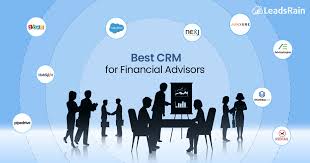
The time demands on financial advisers today are greater than ever before with clients, compliance and market fluctuations putting more and more pressure on day-to-day activities. Although customized financial advice delivery is the core of their service, a large portion of the time of the advisors is commonly drawn into administrative activities which do not directly contribute to the relationship between the advisor and the client. These are data entry, scheduling of meetings, tracking of documents, follow ups and compliance record keeping. The demands of administration have come to control a great part of the daily working routine and, hence, advisors are always in need of methods to enable them to concentrate more on advising and much less on paperwork and management of systems.
It is here that customer relationship management technology, or CRM comes into play. CRM systems that focus on the needs of financial advisors help with more than simply storing client contacts-they can automate, streamline, and simplify many of the routine and repetitive activities that bog down everyday work. With the increasing promotion and use of technology, the role of CRM in lessening the administrative burden among the financial advisors has become much better quantifiable and identifiable. The efficient use of effective CRM software has the potential to recover, on behalf of the individual representatives, valuable time, enhance reliability and generate some space in terms of substantive contact with clients.
Automating Repetitive Workflows
Automation is one of the major categories in which CRM saves administrative efforts. Some of the recurring tasks of business financial advisors are client review scheduling, sending reminders and follow ups on documents. Most of these functions can be automated by the help of a CRM system. As an example, reminders set on the calendar and client correspondence on specific days or the triggering of workflows whenever reviewing documents could be signed or risk tolerance checked can be configured in advance. This has the effect of eliminating the human element of oversight and makes sure that no important activity is overlooked.
Automation also enhances consistency in service delivery. Financial advisors do not need to remember or use a paper checklist since they can preset workflows in the CRM. Such workflows will make sure that every customer gets the necessary communications and attention promptly without necessitating a rise in the workload of the advisor or the team. Not only does this save on time wasted, but it also enhances the client experience overall because of the use of professionalism and reliability at all times of interaction.
Centralizing Client Information
The other benefit in which CRM for financial advisors reduces administrative burden is through centralization of client data. In the absence of a CRM, advisors could keep the information of their clients on several platforms; spreadsheets, email folders, notepads, and paper files. The communication process in this fragmented method is hard and time-wasting in getting accurate up-to-date information at the point of its demand. CRM systems do away with such ineffectiveness as they integrate all the client records, communications, documents, as well as interactions in a sorted digital platform.
Having data in the center enables faster access to whatever is relevant with regard to the client. In a few seconds, advisors have a chance to retrieve such history of account, previous meeting notes, contact information, and significant dates. This saves time when it comes to getting ready to make the meetings quicker and lowers the possibility of mistakes and/or slips. The fact that no longer time is being spent rummaging through various systems or files will accumulate very fast and in turn enable the advisors to focus their energies in other activities that are considered to be of a higher value.
Simplifying Compliance and Documentation
Adherence has become an essential aspect of the daily life of every financial adviser, however, it can considerably be accompanied by loads of paperwork and scrupulous monitoring. CRM systems could be very crucial in streamlining these processes. Many of the best CRM software have features with pre-defined compliance monitoring edit tracks, and capability of storing time-stamped notes and documents. This eliminates provenance manual burden and makes answering requests by auditors or other regulators that much easier.
Besides, CRMs are capable of producing reports and summaries which aids in illustrating fiduciary duty and transparency. The advisors are able to record all the interactions made with the clients, advice that is provided, and decisions made in the CRM. A detailed digital record would make sure that everything proceeded with the client is noted and available, something that, in addition to alleviating the compliance issue, would also help with accountability. The outcome is that the work flow becomes smoother and less time is consumed on collection of paperwork or checking activity.
Enhancing Team Collaboration
Administrative functions do not belong only to the advisor: support staff, assistants, and other members of the team are frequently established to engage in the schedule, documents handling, and contacts with the client. An effective CRM software has the ability of collaboration; since all people can access the same current data on clients. This also helps to avoid redundancy and confusion between the working team members hence avoid creating avoidable administrative delays.
Assigning and tracking of tasks is easily achievable when a team uses a common CRM platform. Each person is aware of what he or she is responsible for and up-to-date information is reflected in real-time. This enhances internal workflow and assists to make sure that things do not fall through the gaps. No longer does a team member have to update client contact information; or upload a signed document; the CRM provides transparency thus limiting the necessity of follow-up mails or status meetings.
Reducing Data Entry and Manual Updates
The most time consuming and inaccurate part of the financial advisory administration is manual data entry. The use of CRM platforms would go a long way in alleviating most of this burden by means of integrations and intelligent data capture. Lots of CRMs integrate with custodians, financial planning software, portfolio management systems, and email systems so that data is automatically synced between the systems. This is so that wasted entry does not occur and to make sure that the information is inputted the same way in the systems.
To add on to this, forms and templates usually found in CRMs have the effect of standardizing the collection of data. When bringing onboard a new customer or revising risk profiles, the digital form can be used to relay information into the CRM database. This does not only accelerate the process but also enhances accuracy and completeness in the data. The less that advisors will have to spend updating files by hand, the more time they can interact with clients or develop their practice.
Improving Scheduling and Time Management
Administration of meetings and time planning may eat a lot of administrative time than anticipated. CRM platforms that have built-in calendars and appointment and scheduling features minimize the friction related to scheduling of clients, reminder sending and follow-ups. Other CRMs provide customer facing portals in which customers can make their own appointments according to the availability of advisors, eliminating the back and forth transacting.
Also, the CRMs enable advisors to remind important moments like reviews of the portfolio, renewal of policies, or birthdays. These reminders make sure that the important dates should not be forgotten and will help the advisors to remain on top of their mind in regards to their client obligations without problems. Through improved scheduling management, CRM tools will enable the advisors to better manage their own time in a more valuable way and decrease the occurrence of forced chronic stress due to schedule scheduling conflicts or meeting omission.
Strengthening Client Communication
Financial advisor relationships with their clients are all centered on communication, which is not easily exhausted when carried out manually. This becomes easy with CRM systems as structured and trackable communication channels are made possible. Advisors will be able to generate templates of communications, program templates of email chains as well as save all the communication at the profile of the customer. This makes outreach more efficient and consistent.
The second advantage is that it is possible to personalize communication on a large scale. CRM systems have the capability of drawing in customer specific data; investment goals, life events, or financial milestones to integrate messaging. This enables the advisors to send a bulk notification to clients with a personal touch which increases engagement with the clients without a corresponding workload. The communication is clear and comes on time leading to trust and minimizes the effort the advisor has to make to repeat the explanation or clarify something.
Supporting Business Growth without More Admin Work
In line with expansion of the book of business by financial advisors, administrative work also tends to increase. This is potentially a cause of operational strain and a decline in the quality of the service without the appropriate systems in place. The use of CRM tools helps advisors to scale without undergoing a proportionate administrative burden. CRMs facilitate the structure required to assist more clients with less or the same resources due to the fact that they automate and make their fundamentals streamlined and orderly.
Moreover, the information provided by CRM can assist the advisors to explore their growth opportunities. Since advisors can understand the trends in data- e.g. the extent of client interaction, gaps in service, or the referral pattern, they can make informed business decisions, without spending time on complex manual analysis. By doing so CRM does not only minimize administrative work but also takes part in long term planning, which allows firms to become scalable.
The administrative burden on financial advisors is not only frustrating but also directly impacts their ability to serve clients effectively and grow their business. Tasks like manual data entry, document tracking, compliance, and scheduling consume significant time and focus. CRM technology helps alleviate these pressures by automating workflows, centralizing client data, improving team collaboration, and simplifying compliance. In an industry where time is both limited and valuable, reducing administrative overhead is essential. CRM systems not only save time but also enhance service quality and business scalability. As more firms adopt CRM tools tailored to financial services, the benefits will continue to grow—in operational efficiency, client experience, and long-term profitability.


